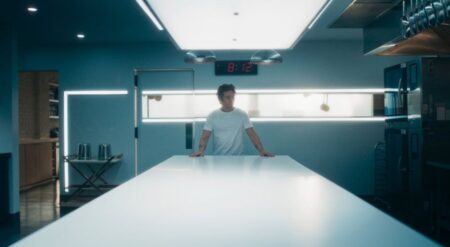
Away is a Sci-Fi drama series streaming exclusively on Netflix and stars Hilary Swank. Five astronauts begin a multi-year journey. Their destination: the red planet Mars. To reach, establish a temporary colony and then return will take three years. Three years during which they will be millions of miles from all those they cherish the most. From all that they have known and love. It is a lot to ask. They say they are willing to make this sacrifice. But can anyone truly know, till it’s too late to go back?
Earlier this year, I had the pleasure to review a Sci-Fi puzzle game titled Deliver Us the Moon. When I initially approached it, I thought the concept of simply reaching the moon would feel almost mundane when compared to the far more outrageous space exploits I have experienced during my decades as a game player. But instead, the opposite occurred. By experiencing space in a more, if you will forgive the term, grounded way, I instead experienced a greater sense of its majesty. Of the wonder of it. And indeed, how dangerous and unforgiving an environment space can be. Many of the same experiences were had for me while watching Away.
The series opens as the international crew of five prepare to leave Earth aboard the shuttle Atlas. The Atlas will be their home for the bulk of the time in space. With a crew made up of astronauts from America, Russia, India, Britain, and China they intend to represent the world, coming together to do what many would say cannot be done. They will go further and stay longer than any individual has ever done before. It is daunting, terrifying and, if successful, will be arguably the greatest triumph in human history.
But even before the shuttle can get past the moon difficulties begin. Shuttle Commander Green’s(Swank) husband suffers a stroke, leaving her questioning whether or not she should go through with the mission. While she ultimately continues with her mission, the ongoing struggles back on earth play a large part of Away‘s narrative. As her husband works at mission control, this added viewpoint both works well to keep the audience in touch with what transpires there, as well as highlighting that it isn’t just the astronauts that will struggle with their three-year mission.

Green’s family is used skillfully to look at the added stresses that having a family member beyond reach can do. Adding in the after-effects of the only Earthbound parent’s recent medical episode and you have a lot to put on a family. Happily though, Away never goes overboard with its dramatization of the family. Yes, the 15-year-old daughter does a little acting out, but nothing over the top crazy. Likewise, the dad struggles with balancing his health, desire to take care of his daughter, and look after his wife from work, but never to an over-sensationalized way. It feels authentic. This authenticity also extends to the main focus of the show. The crew of the Atlas.
Away’s inaugural season covers the crew’s first year in space. Over that time numerous problems occur. Some are mechanical, some are medical, and some are emotional. Every problem touched on is given an adequate amount of weight. Whether it be life-threatening, which a lot is when surrounded by the vacuum of space, or just a momentary annoyance. The thing I liked best about these moments of struggle, and what many might like lest about the show, is the pacing of their resolution.
This series tries really hard to approach space in a realistic fashion. Life-threatening problems often take up an episode or more to resolve and involve a lot of calling back to the ground and waiting for a response. During the interim, the pressures, both in space and on the ground play out. I appreciated Away’s commitment to slower problems. While it sometimes caused an episode to drag a little, I feel it helps highlight how much ongoing strain is present in the show. No problem is easily solved when your sink has a few hundred pieces or asking a question has an hour lag due to the distance the signal is sent.
This sense of realism is extended to the ship and living conditions as well. At least as far as I can tell. I do not have any science training, and I wouldn’t be shocked to find out any number of things are not “scientifically accurate “ but they at least feel like how things would be handled. More than once while watching NASA workers cobble together a makeshift solution to a problem I was reminded of moments from the Apollo 13 mission and how solutions were cobbled together from whatever was at hand to get the job done.
When all is said and done I truly enjoyed my watch of Away. It’s a blend of mechanical, emotional, and medical struggle, both in space and on the ground, delivered an intriguing story. I felt for every major character at least once, and some of the growth they experience over the ten episodes is fairly impressive. If you are in the mood for some hard Sci-Fi, mixed with a healthy dose of drama and character building I would easily recommend Away.
Away is streaming now on Netflix.
Away
-
Rating - 9/109/10
TL;DR
When all is said and done I truly enjoyed my watch of Away. It’s a blend of mechanical, emotional, and medical struggle, both in space and on the ground, delivered an intriguing story. I felt for every major character at least once, and some of the growth they experience over the ten episodes is fairly impressive. If you are in the mood for some hard Sci-Fi, mixed with a healthy dose of drama and character building I would easily recommend Away.






